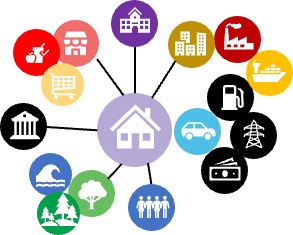Transition Engineering of Farm, Fish, and Access to Food Networks
REF: EGIS2021-SPK6
This PhD is focused on developing the conceptual framework, designing, testing and demonstrating a “Food Network” tool. The tool will curate data for the primary production from land and sea, the freight of produce and livestock from the islands and food into the islands, and the access to nutrition by residents. In addition, the “Food Network” data tool will provide geospatial exploration of the transition to local food markets that allows efficient reduction in fossil fuel use in freight transport on the ferries and the land. The concept to be explored is the self-curation of wellbeing information by residents of an area, including the kinds of food they have access to, their ability to maintain good nutrition, the travel involved in accessing food,[1] and the ways that community garden, farmers markets and cooperative food systems work.[2]
The project will also aim to achieve a good working relationship with the supermarket chains and to develop data about seasonal, local and tourist aspects of the supermarket supply chain operation.[3] The Northlink ferry service will also be involved as a key partner in the project. The project will explore blockchain as a way to curate reliable data in the freight supply chain and from primary production in the islands. The work will also use agent based simulation tools like AnyLogic to study changes in ferry services to optimise utilization and minimise fuel use.[4]
The objective of the PhD is to develop the necessary techniques to create “Food Network” data for a range of stakeholders and to process and analyse the results. The work will require use of ArcGIS and Python script to capture the geospatial nature of the Food Network. The intention of the research is to create a new tool that can be commercialised for use by communities around the world.
The multidisciplinary nature of the project requires a large supervisory team. It is expected that the student will be based primarily at Heriot-Watt University Orkney campus.
The supervisory team brings the following skill sets to the project:
Professor Susan Krumdieck: Energy Systems Engineering, Transport and Energy Engineering, Urban Form, Energy Transition
Funding
The project is funded for 3 years and covers the PhD fees and stipend (currently £15 285 per annum).
Eligibility
This project is available to UK and International students. The successful candidate will have a B.Sc. (2:1 or higher) and M.Sc. (distinction) or equivalent, and ideally additional experience in computer science, modelling, image analysis or engineering, ideally with some experience of applying these skills to other disciplines (e.g. in the life sciences). You will have good programming skills, preferably in Python and ArcGIS or other advanced programming languages. Knowledge of survey protocols and social science frameworks would be advantageous. You will be highly self-motivated and confident enough to seek out solutions beyond the current team if required. Candidates that have some appreciation of freight transport or practical experience of working in the food industry. The PhD will require sea-time on board. You will embrace new challenges and environments and be able to fit into new teams rapidly. You must be able to describe complex issues in a means that is accessible to fishermen with whom you will work.
How to apply
To apply you must complete our online application form. Please select PhD programme Energy Transition and include the full project title, reference number and supervisor (Prof SP Krumdieck) on your application form. Ensure that all fields marked as ‘required’ are complete.
You must complete the section marked project proposal; upload a supporting statement documenting your reasons for applying to this particular PhD project, and why you are an ideal candidate for the position. You will also need to provide a CV, a copy of your degree certificate/s and relevant transcripts. You will be asked to enter details of an academic referee who will be able to provide a technical reference. Until your nominated referee has uploaded their statement, your application will not be marked as complete and will not be considered by the review panel. You must also provide proof of your ability in the English language (if English is not your mother tongue or if you have not already studied for a degree that was taught in English within the last 2 years). We require an IELTS certificate showing an overall score of at least 6.5 with no component scoring less than 6.0 or a TOEFL certificate with a minimum score of 90 points.
Please contact Prof Susan Krumdieck (S.Krumdieck@hw.ac.uk) for further information or an informal discussion.
Time-lines
The ICNZ is anticipating advertising of the scholarship in November. Applicants must be available to start the PhD in 2023
Submit to: Susan Smith
[1] Rendall, S., S. Page, F. Reitsma, E. van Houten, S. Krumdieck, Quantifying transport resilience: active mode accessibility, Journal of the Transportation Research Board, Vol. 2242 (2011) 72-80.
[2] Asuncion, J., Krumdieck, S., Rendall, S., Page, S. and Murray, R., Geographic Energy Adaptive Potential of Farmers’ Market System as Compared with Conventional Supermarket System, (13-17 Jan 2013 Washington DC) Transportation Research Board 92nd Annual Meeting, Paper number 13-1158
[3] Asuncion, J., Page, S., Murray, R. and Krumdieck, S., Analysis of the truck trip generation characteristics of supermarkets and convenience stores. (18-21 Mar 2012 Rotorua) IPENZ Transportation Group Conference.
[4] Gallardo, P., R. Murray, S. Krumdieck, A sequential optimization-simulation approach for planning the transition to the low carbon freight system with case study in the North Island of New Zealand, Energies, 14(11), (2021) 3339.
